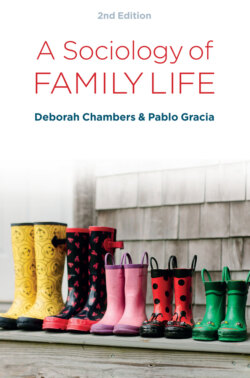Читать книгу A Sociology of Family Life - Deborah Chambers - Страница 12
Engels: family, private property and the state
ОглавлениеMany of the prominent political ideologies preceding the twentieth century failed to advance the cause of women. The idea that the position of women in society is an indicator of social progress emerged through the eighteenth-century Scottish Enlightenment. But this did not yet translate into equal rights for the sexes (Therborn 2004). Although science overtook religion as the established authority for advancing knowledge in the nineteenth century, gender inequality and women’s inferiority persisted in scientific discourse. The rationale for gender difference was now established by Nature, rather than God. With his colleague Karl Marx, Frederick Engels challenged this account by arguing that women’s oppression was merely treated as fixed and unchangeable. Engels explained religious or ‘natural’ accounts as flawed ideological rationalizations employed to support a system of exploitation. He argued that the family was an unnatural institution designed to ‘privatize’ wealth and human relationships.
Engels’ book The Origin of the Family, Private Property and the State (1972 [1884]) is a seminal work that traced the evolution of family organization from prehistory to the present. It comprised a historical approach to the family in relation to the issues of social class, female suppression and ownership of private property. His aim was to offer a social explanation for women’s oppression with regard to the rise of the patriarchal family and private property during a particular historic period. This explanation was quite daring for the time: it challenged the dominant view that women’s inferior status was God-ordained or founded on biological, physical, intellectual and moral inferiority. According to Engels, the traditional monogamous family household was a recent concept that supported capitalist, property-owning societies. He argued that the division of labour and commodity exchange between individuals emerged as social class distinctions at this last phase of social evolution, and that the repression of women then became clearly visible.
For Engels, the patriarchal nature of the current family system was one in which women were not only servants to men but, to all intents and purposes, prostitutes. He claimed that liberation from class and gender oppression was possible for all. Engels explained that, originally, unrestricted sexual intercourse prevented a sure way of determining parentage. Descent could only be traced by the female line, in compliance with matriarchal law. As mothers, women received respect and deference which led to complete rule by women (gynaecocracy). The shift to monogamy, in which a certain woman was reserved exclusively for one man, undermined the primeval religious law of sexual freedom. Engels claimed that property and inheritance through family ties prevent people from engaging in free, passionate relationships. In his view, it was only through socialism that ‘individual sex love’ could occur and a communist society could lead to communal living, equality, sexual freedom and the collapse of the state.
Feminist writers have criticized Engels for not giving sufficient weight to women’s issues. Although Engels distinguished between social production and reproduction, he subsumed reproduction under production by claiming that women’s liberation is dependent on economic liberation (Evans 2011). Engels’ work has also been criticized for using inaccurate anthropological sources. Nevertheless, his book represented a significant critique of the Victorian nuclear family and continues to reverberate as a daring critique of sexual inequality. By studying the connection between patriarchy and capitalism, he was able to address the question of sexual inequality and the family, both historically and politically. By exploring how social divisions arise through the family, Engels identified both production and reproduction as the material bases of society. This approach has been a key resource for subsequent sociologists in theorizing the intersection of class and gender. Engels made a significant contribution to feminism and the study of inequalities from a conflict-based approach. By contrast, the emergence of American sociological studies in the early twentieth century, addressed below, was concerned with explaining a systematic connection between the structures of capitalism and the composition of the family by using a consensus-based approach.
